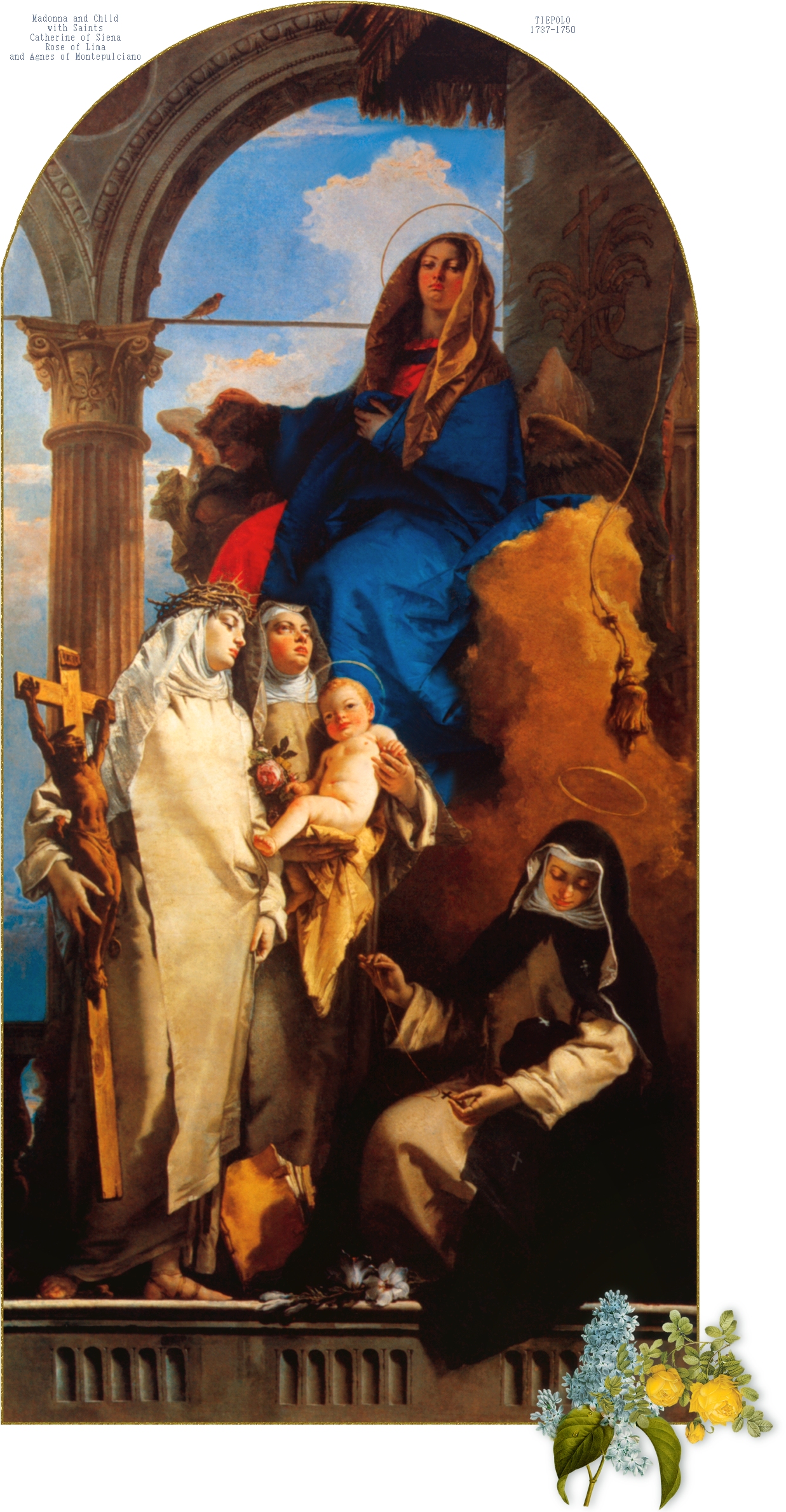
The Virgin with Sts. Catherine of Siena, Rose of Lima and Agnes of
Montepulciano
TIEPOLO
1737-1750
 Number
9 Number
9
Saint
Catherine of Siena
SEE ALSO: HERE.
April 30
1347-80
Born on March 25 at Siena, Italy, daughter of a dyer and the
youngest of twenty-five children, she began to have the mystical
experiences she was to have all her life when she was only six. She
resisted all efforts of her parents to have her marry and devoted
herself to prayer and fasting. She became a Dominican tertiary when she
was sixteen and increasingly experienced visions of Christ, Mary, and
the saints, interspersed with diabolical visions and periods of
spiritual aridity. She ministered to the ill in hospitals, devoting
herself to caring for patients with particularly distressing illnesses
like leprosy and advanced cancer cases. Her supernatural gifts
attracted ardent supporters, but many believed she was a faker and
caused her to be brought before a chapter general of the Dominicans in
Florence, where the accusations were dismissed. At this time, BI.
Raymond of Capua was appointed her confessor, in time became her
disciple, and later was her biographer. On her return to Siena, she
devoted herself to caring for those stricken by a plague that
devastated the city, ministered to condemned prisoners, and was
acclaimed for her holiness, aid to the spiritually troubled, and
abilities as a peacemaker. She whole-heartedly supported Pope Gregory
Xl's call for a crusade against the Turks, and while on a visit to Pisa
in 1375 [a visit that brought on a religious revival in that city]
received the stigmata, invisible during her lifetime but clearly
apparent at the time of her death. She was unsuccessful in attempting
to mediate between Florence and Pope Gregory, but her meeting with the
Pontiff in Avignon and her urging led him to return the papacy to Rome
in 1376. At his request, she again returned to Florence, and this time
she was successful in reconciling Florence and the Holy See. On her
return to Siena, she devoted herself to recording her mystical
experiences, which were published as the Dialogue of St. Catherine. On
Gregory's death in 1378, the Great Schism began when Urban VI's
election as Pope was contested by a group of dissident cardinals, who
elected Robert of Geneva antipope Clement VII at Fondi and set up a
papal court at Avignon. Catherine worked unceasingly to secure support
for Urban and end the schism, though never hesitating to censure Urban
for some of his actions. He welcomed her criticisms and brought her to
Rome, where she continued her efforts to gain support for him. She
suffered a paralytic stroke on April 21 and died in Rome a few days
later, on April 29. Catherine was one of the greatest of Christian
mystics. In addition to her Dialogue,
some four hundred of her letters to people in every class of society
are still extant. She was canonized in 1461, made patron of Italy in
1939, and was declared a Doctor of the Church by Pope Paul VI in 1970.
Saint Rose
of Lima
August 23
d. 1586
Isabel de Santa Maria de Flores was born at Lima, Peru, of
Spanish parents and took the name Rose at confirmation. Noted for her
beauty, she resisted her parents' efforts to have her marry and
practiced great austerities, taking St. Catherine of Siena as her model
from her childhood days. She became a Dominican tertiary, lived as a
recluse in a shack in the garden she had worked to help her parents,
who had fallen on difficult times, and experienced mystical gifts and
visions of such an extraordinary nature that a commission of priests
and doctors was appointed to examine her. They decided they were of
supernatural origin. Stories of her holiness spread, and her garden
became the spiritual center of the city; when earthquakes strock
nearby, her prayers were credited with sparing Lima. In ill health, she
accepted the offer of Don Gonzalo de Massa and his wife to take care of
her, and she spent the last three years of her life in their home in
Lima and died there on August 24. She was canonized in 1671 by Pope
Clement X, the first Saint of the New World. She is patroness of South
America.
Saint Agnes
of Montepulciano
April 20
c. 1268-1317
Born in Gracchiano-Vecchio, Tuscany, she entered the convent at
nearby Montepulciano when only nine. When a new convent was opened at
Procena she was transferred there and soon became abbess although only
fifteen, attracting many postulants by the sanctity and austerity of
her life. About 1300 the inhabitants lured her back to Montepulciano by
building a new convent of which she became prioress, and which she put
under the Dominican rule. She was famous for her visions [she was
reported to have received Communion from an Angel and held the infant
Christ in her arms], experienced levitation, and performed many
miracles. She died in the convent at Montepulciano, and was canonized
in 1726.
 
HOME---------------PRAYERS AND
DEVOTIONS-----------------LITANIES
www.catholictradition.org/Saints/saints-special9.htm
|





